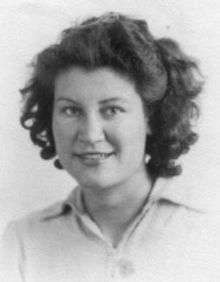Phyllis Nicolson
Phyllis Nicolson (21 September 1917 – 6 October 1968) was a British mathematician most known for her work on the Crank–Nicolson method together with John Crank.
Phyllis Nicolson | |
|---|---|
 | |
| Born | Phyllis Lockett 21 September 1917 |
| Died | 6 October 1968 |
| Nationality | United Kingdom |
| Alma mater | Manchester University |
| Known for | Crank–Nicolson method |
| Scientific career | |
| Fields | Mathematics, Physics |
| Thesis | Three Problems in Theoretical Physics[1] |
Biography
Nicolson was born Phyllis Lockett in Macclesfield and went to Stockport High School for Girls.[2] She graduated from Manchester University with a B.Sc. in 1938, M.Sc. in 1939 and a Ph.D. in Physics in 1946.[2] She was a research student in Cambridge from 1945 and a Tucker-Price Research Fellow of Girton College, Cambridge from 1946 to 1949.[2] She married Malcolm Nicolson, also a physicist, in 1942 and had two sons. The family moved to Leeds where Malcolm Nicolson was appointed to a lectureship in Physics at Leeds University.[3] Malcolm Nicolson died accidentally in 1951, and Phyllis was appointed to take over his lectureship.[3] In 1955, she married physicist Malcolm McCaig by whom she had another son.[3] She died from breast cancer in 1968 in Sheffield.
Work
During her time in Manchester, Nicolson worked with Douglas Hartree and became a proficient numerical analyst and an expert user of Hartree's differential analyser.[4] Nicolson initially worked on cosmic ray problems, but after the outbreak of war Hartree's differential analyser group pursued defence-related problems. Two of the problems in her thesis are derived from work done for the Ministry of Supply.[5] One of these problems was on solutions of the heat equation, and with her colleague John Crank she investigated the numerical stability of several solution techniques. The algorithm now known as the Crank–Nicolson method emerged from this work and was published in 1947.[6]
Publications
- D.R. Hartree, P. Nicholson, N.Eyres. J. Howlett, and T. Pearcey. “Evaluation of the Solution of the Wave Equation for a Stratified Medium”, Air Defense Research & Development Establishment M.R., No. 47, May 1944.
- D.R. Hartree, P. Nicholson, N.Eyres. J. Howlett, and T. Pearcey. “Evaluation of the Solution of the Wave Equation for a Stratified Medium:Normalisation”, Radar Research and Development Establishment, RRDE Report No. 279, March 1945.
- Three Problems in Mathematical Physics. PhD Thesis, University of Manchester, 1946.[5]
- The Sun’s Magnetic Field and the Diurnal and Seasonal Variations in Cosmic Ray Intensity Janossy, L.; Lockett, P., Proc. of the Royal Society of London. Series A, Mathematical and Physical Sciences, 1941, Vol.178(972), pp. 52–60.
- Meson Formation and the Geomagnetic Effects. Janossy, L.; Nicolson, P., Proc. of the Royal Society of London. Series A, Mathematical and Physical Sciences, 1947, Vol.192(1028), pp. 99–114.
- A practical method for numerical evaluation of solutions of partial differential equations of the heat-conduction type,[6] Crank, J; Nicolson, P, Mathematical Proc. of the Cambridge Phil. Society, 1947, Vol.43(1), pp. 50–67.
- A Theoretical Study of the Influence of Diffusion and Chemical Reaction Velocity on the Rate of Exchange of Carbon Monoxide and Oxygen between the Red Blood Corpuscle and the Surrounding Fluid, P. Nicolson and F. J. W. Roughton. Proc. of the Royal Society of London. Series B, Biological Sciences, Vol. 138, No. 891 1951, pp. 241–264.
References
- "The Mathematics Genealogy Project - Phyllis Nicolson".
- Girton College Register. Cambridge: Girton College.
- "Nicolson biography".
- 1929-, Froese Fischer, Charlotte (2003). Douglas Rayner Hartree : his life in science and computing. Singapore: World Scientific. ISBN 9789812795014. OCLC 666958945.CS1 maint: numeric names: authors list (link)
- PhD Thesis: Three Problems in Mathematical Physics. University of Manchester. 1946.
- Crank, J; Nicolson, Phyllis (1947). "A practical method for numerical evaluation of solutions of partial differential equations of the heat-conduction type". Mathematical Proceedings of the Cambridge Phil. Society. .43(1) (1): 50–67. Bibcode:1947PCPS...43...50C. doi:10.1017/S0305004100023197.